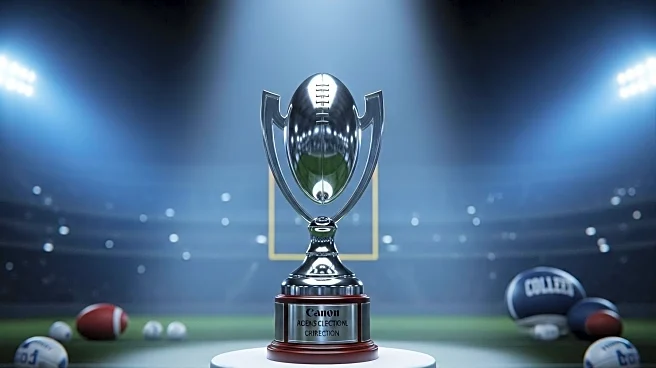What is the story about?
What's Happening?
The College Sports Commission (CSC) has issued a correction regarding the value of Name, Image, and Likeness (NIL) deals it has approved. Initially, the CSC reported that the total value of cleared deals was $79.8 million, but this figure included pending deals. The actual value of approved deals is $35.42 million, indicating an overstatement of $44.4 million. This error was attributed to a clerical mistake in data provided by Deloitte, which developed the NIL Go platform used by the CSC. The commission also corrected the number of approved deals from 8,359 to 6,090. The CSC is tasked with analyzing thousands of business deals made by athletes, ensuring they comply with guidelines to maintain eligibility. The commission, which began operations on July 1, is working to improve processing times and transparency, despite operating with a limited number of full-time employees.
Why It's Important?
The correction by the CSC highlights the challenges faced in managing NIL deals, which are crucial for college athletes seeking to monetize their personal brands. Accurate reporting is essential for maintaining trust and transparency in the system, which impacts athletes' eligibility and financial opportunities. The error underscores the complexity of the task, as the CSC navigates a new landscape of athlete compensation. This development may influence public perception and policy discussions around NIL deals, potentially affecting future regulations and the operational strategies of institutions involved in collegiate sports.
What's Next?
The CSC is expected to continue refining its processes to ensure accurate reporting and efficient approval of NIL deals. Deloitte has committed to implementing measures to prevent future errors, which may involve enhancing data management systems and increasing oversight. As the CSC releases figures periodically, stakeholders, including athletes, schools, and regulatory bodies, will likely monitor these updates closely. The commission's efforts to speed up processing times and improve transparency may lead to adjustments in its operational framework, potentially influencing broader discussions on athlete compensation and collegiate sports governance.
Beyond the Headlines
The correction of NIL deal values by the CSC may have broader implications for the ethical and legal dimensions of athlete compensation. As the system evolves, questions about fairness, equity, and the impact on amateurism in college sports may arise. The CSC's transparency efforts could set a precedent for other organizations managing similar compensation frameworks, prompting discussions on best practices and regulatory standards. Long-term shifts in the collegiate sports landscape may occur as stakeholders adapt to new norms in athlete compensation.
















